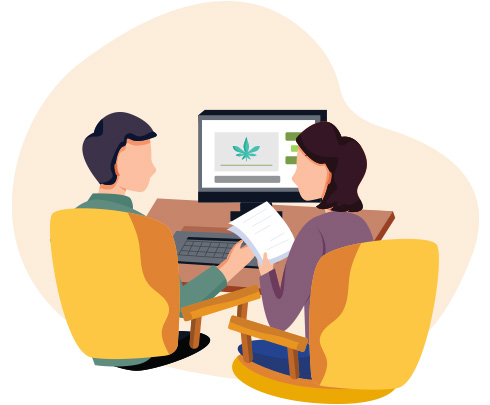
If you are concerned about your own or someone else’s use of cannabis, alcohol, or another drug, please contact Health Link at 811 (1-866-408-5465 for internet phone users) or the Addiction Helpline at 1-866-332-2322.

Being a parent or caregiver is hard work. With so much information out there to make sense of, it's easy to feel overwhelmed at the idea of talking to your child about substance use. It can be hard to know where to start. Here are some helpful tips when talking about cannabis and other substance use with children and teens.
Topics
Start Early & Talk Often|Stick to the Facts|Share Your Experience|Support Healthy Decisions|Set Boundaries|Have Their Back|Recognize Their Strengths|Be an Influencer|If Your Teen Is Already Using Cannabis|More Info
Talking with children and teens about substance use is not a one-time event. Start talking with your child early, around 10 years old or even younger, about the risks and benefits of cannabis and other substance use, such as alcohol and tobacco. Let them know that you are open to talking about substance use and that you want to hear their thoughts and try to listen as much as you talk.
Many small conversations over time are better than one big one. It's important to take the time to connect with your child and have conversations about the things they care about. If they feel comfortable talking to you about anything, you will be in a better position to support them in their choices about substance use. Try starting a conversation when you're in the car, out for a walk, see a cannabis or liquor store or if you see someone using substances in a movie or on television. Discussing substance use regularly is a good idea as it will help your child learn your family values and expectations while they are also exposed to new people, ideas and experiences as they grow and mature.
Try to stay open and non-judgemental. Acknowledging both the benefit and harm of substance use can help you to have a more balanced perspective when talking with children and teens. Avoid scare tactics or exaggerating the negatives.
If a child or teen feels like they are being judged or lectured, he or she is less likely to hear your message and open up to you. Try to stay calm and respectful, even if your child's opinion is different from your own. This can be difficult and takes practice! You don't have to be an expert, either. If there is something you don't know, find the answer together.
If you're struggling to get your teen to open up, try shifting the focus by talking about your own experiences so they feel safer sharing. Not sure what to say if your teens asks if you have used substances before? Here are some tips on how to share your experiences in a helpful way:
Studies now show that the brain continues to grow and change until around the age of 25. The brain of a young person is more controlled by emotions than reason, making them more likely to take risks and not consider the consequences. As parents and caregivers, we can guide them through the process of decision making and help them learn from their actions.
It's also important to talk about the risks of substance use on a young person's brain. Until 25, substances like cannabis can have a negative effect on memory, learning, attention, judgment, and decision-making. This can impact their performance at school, sports and other activities
Teaching your child about acceptable behaviours and boundaries within the family can be challenging but it's important that they know your values and what is expected of them. The boundaries you set will be different depending on the age of your child. As your child gets older, talk about the effects that substance use could have on all major areas of their life, especially those that matter to them, like getting along with their friends, saving money or being a role model for younger siblings. Be open to hearing your teen's perspective.
Creating a solid connection your child, where they feel emotionally supported, is one of the most important things you can do to protect them from harmful substance use. You can do this by taking the time to connect with them on a regular basis. Try to eat a family meal together at least once per day or find activities or hobbies you can do together.
Let your teen know you will be there for them when they need you. Create a secret code word, phrase, or picture that only you and your family members know. Then, if your teen is ever in a situation where they need your help but don’t want others to know, they can text or say the code, and you will know they need you.
Children and teens who feel good about themselves and have high self-esteem are less likely to use substances in a harmful way. You can build your child's self-esteem by helping them recognize their strengths and interests. Provide them with opportunities to practice skills that make them feel confident and capable like participating in household chores, planning family meals, or taking care of pets and younger siblings. When they complete a task or activity, take the time to recognize their efforts.
As our children get older, it can be difficult to see how they are watching and learning from our actions. The truth is, parents and caregivers continue to be role models and strong influences for their children as they grow. For example, children see how adults deal with problems and manage feelings, and how they celebrate special occasions. They also notice when, why, and how we use substances.
There are no perfect parents. What matters most is that your children know they are loved and that they can talk to you about their feelings and challenges.

Whether or not they say it, your children care about your opinion. It matters and can help them to make healthier decisions. For more ideas on how to talk to children and teens about substance use, check out our Parent Handbook.
If your teen is using cannabis or other substances, talk to them about:
If you suspect that your teen is using substances in a harmful way or see a pattern of change in their behaviour that concerns you, talk to them. Tell them that you care about them and are concerned, using specific examples to explain why. If substance use ends up being the issue, help is available. And remember, as a parent, you can also seek support from a health care provider to help you figure things out and find new ways of reaching your child.
If you are concerned about your teen's substance use, connect with a Healthcare Provider for support or call Health Link at 811 (1-866-408-5465 for internet phone users) or the Addiction Helpline at 1-866-332-2322.